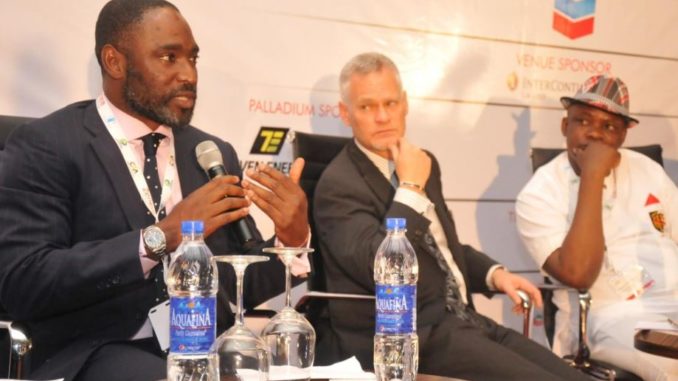
By Chijioke Ohuocha
LAGOS (Reuters) – Nigeria needs at least $14 billion a year in new investment over the next five years to raise oil output to 2.2 million barrels a day (bpd) and even higher spending to lift it to 3 million bpd, the head of a company producing oil in the country said.
Ladi Bada, chief executive of Shoreline Natural Resources, a joint venture with oil and gas interests in southern Nigeria, estimated that about $9 billion a year is currently being invested in the oil industry from public and private sources.
Nigeria’s oil industry has long suffered from under-investment.
“If we continue to invest $9 billion, we won’t grow volumes,” Bada told a business conference in Lagos late on Wednesday.
He said at least $14 billion a year in new investment was needed for Nigeria to produce 2.2 million bpd of oil, the production level which the national budget is based on.
Bada said Africa’s top oil producer would require investment of between $18 billion and $20 billion every year for the next five years to boost output to 3 million bpd.
Nigeria, Africa’s largest economy, faces its worst crisis in more than 20 years, brought on by low oil prices which have slashed government revenues, hammered the currency and caused chronic dollar shortages.
However, overall oil production has recovered to around 2 million bpd after months of attacks, mainly by the Niger Delta Avengers, on oil installations cut output by over 600,000 bpd.
The Nigerian government has joint ventures with oil companies but struggles to fund its share of commitments. Bada said the government was in arrears of $5 billion.
Another factor hampering output is the lack of an oil industry law.
The government has said it was working on new oil and gas policies to attract more private investors and boost crude production by 500,000 barrels a day by 2020.
“The lack of an oil law has held back investments in the sector while the government does not have the funds to operate the joint ventures for which it has a majority shareholding,” Bada said.
The Petroleum Industry Bill, stuck in parliament for a decade, aims to tackle everything from an overhaul of state oil company NNPC to taxes on upstream projects in a sector riddled with corruption.
The Senate aims to almost complete work by year-end on two major areas of long-delayed legislation to tackle problems in managing the nation’s oil wealth.
In June, Nigeria said it had signed agreements worth $80 billion with Chinese firms to invest in Nigeria’s oil and gas infrastructure but no details have emerged yet.
Bada said the government was considering allowing joint ventures to be self-funding and then possibly incorporating them from 2020 but there isn’t a clear framework yet.
He said the contracting cycle in Nigeria takes around 24 months, compared to 6-9 months in most other OPEC countries.
Bada said it cost local producers around $20 to produce each barrel of oil. That could be cut to $12 but for higher security costs in the Delta and funding costs. He said oil firms met the junior oil minister on Wednesday to tell him of the dangers that militant attacks posed to their operations.
Nigeria also needs to upgrade its gas infrastructure and build new plants for domestic consumption, especially for electricity which is in short supply. Bada said the West African nation needed at least $6 billion a year in investment to boost gas output.
(Editing by Adrian Croft)

